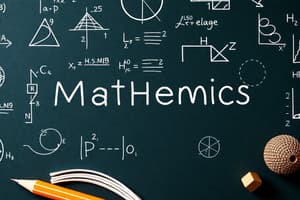Podcast
Questions and Answers
What is the first step in mathematical problem solving?
What is the first step in mathematical problem solving?
- Identifying the problem (correct)
- Communicating the solution
- Evaluating the solution
- Developing a strategy
Which type of reasoning involves generating a hypothesis based on observations?
Which type of reasoning involves generating a hypothesis based on observations?
- Deductive reasoning
- Analytical reasoning
- Abductive reasoning (correct)
- Inductive reasoning
What is essential for ensuring a solution is correct and complete?
What is essential for ensuring a solution is correct and complete?
- Evaluating the solution (correct)
- Developing a strategy
- Communicating the solution
- Implementing the strategy
Which reasoning type involves deriving specific conclusions from general principles?
Which reasoning type involves deriving specific conclusions from general principles?
When solving a problem, what should follow after developing an appropriate strategy?
When solving a problem, what should follow after developing an appropriate strategy?
Which branch of mathematics focuses on shapes, sizes, and properties of objects in space?
Which branch of mathematics focuses on shapes, sizes, and properties of objects in space?
What is the primary purpose of calculus in mathematics?
What is the primary purpose of calculus in mathematics?
What are axioms in the context of mathematics?
What are axioms in the context of mathematics?
Which type of number includes values such as π and cannot be represented as a simple fraction?
Which type of number includes values such as π and cannot be represented as a simple fraction?
What is the role of proofs in mathematics?
What is the role of proofs in mathematics?
Which branch of mathematics introduces variables and equations for solving unknown values?
Which branch of mathematics introduces variables and equations for solving unknown values?
In mathematics, what do functions represent?
In mathematics, what do functions represent?
What is the significance of statistics in mathematics?
What is the significance of statistics in mathematics?
Flashcards
Mathematical Problem Solving
Mathematical Problem Solving
Understanding the problem, selecting an appropriate method, applying the method, evaluating the solution, and presenting the answer with reasoning.
Inductive Reasoning
Inductive Reasoning
Drawing a general conclusion from specific observations, used to formulate conjectures.
Deductive Reasoning
Deductive Reasoning
Deriving a conclusion from given truths using logic.
Abductive Reasoning
Abductive Reasoning
Signup and view all the flashcards
Mathematical Reasoning
Mathematical Reasoning
Signup and view all the flashcards
Arithmetic
Arithmetic
Signup and view all the flashcards
Algebra
Algebra
Signup and view all the flashcards
Geometry
Geometry
Signup and view all the flashcards
Calculus
Calculus
Signup and view all the flashcards
Statistics
Statistics
Signup and view all the flashcards
Axioms
Axioms
Signup and view all the flashcards
Theorems
Theorems
Signup and view all the flashcards
Proofs
Proofs
Signup and view all the flashcards
Study Notes
Foundations of Mathematics
- Mathematics is a fundamental field encompassing abstract concepts like numbers, quantities, and shapes.
- It explores patterns, relationships, and structures.
- Core branches include arithmetic, algebra, geometry, calculus, and statistics.
- These branches are interconnected, building upon each other to create complex mathematical ideas.
Branches of Mathematics
- Arithmetic: Deals with basic operations on numbers (addition, subtraction, multiplication, division). It underpins more advanced mathematical concepts.
- Algebra: Introduces variables and equations, enabling manipulation and solving of unknown values.
- Geometry: Focuses on shapes, sizes, positions, and properties of objects in space.
- Calculus: Examines continuous change and rates of change through concepts like derivatives and integrals. Widely used in physics, engineering, and economics.
- Statistics: Involves collecting, analyzing, and interpreting data to draw meaningful conclusions.
Fundamental Concepts
- Numbers: Different types include natural numbers (1, 2, 3,...), integers (..., -2, -1, 0, 1, 2,...), rational numbers (fractions), irrational numbers (e.g., π), and real numbers encompassing all numerical values.
- Sets: Collections of objects, crucial for defining mathematical structures and relationships.
- Functions: Relationships between sets of inputs and outputs, often expressed as equations or graphs.
- Logic: The formal study of valid reasoning and arguments, vital for proving theorems and building rigorous proofs.
Axioms and Theorems
- Axioms: Basic assumptions accepted as true without proof, forming the foundation of a mathematical system.
- Theorems: Statements proved based on axioms and previous theorems. Theorem-proving is essential in mathematics.
- Proofs: Demonstrations establishing the validity of theorems. Formal and logical arguments ensure rigor and avoid fallacies.
Applications of Mathematics
- Mathematics is used extensively in science, engineering, technology, finance, and computing.
- It provides tools for modelling and solving problems in diverse fields.
- Precise models of complex systems and phenomena frequently use mathematical concepts and techniques.
- Data analysis heavily relies on statistical methods.
Mathematical Problem Solving
- Identifying the problem: Understanding the question and given information is paramount.
- Developing a strategy: Selecting the appropriate mathematical method for the problem.
- Implementing the strategy: Applying the chosen method to find a solution.
- Evaluating the solution: Assessing the accuracy and completeness of the solution.
- Communicating the solution: Clearly presenting the answer and supporting reasoning.
Mathematical Reasoning
- Deductive reasoning: Deriving a conclusion from premises using logic.
- Inductive reasoning: Drawing a general conclusion from specific instances, often used to formulate conjectures.
- Abductive reasoning: Identifying a possible explanation for an observation, frequently used to formulate hypotheses.
Studying That Suits You
Use AI to generate personalized quizzes and flashcards to suit your learning preferences.




